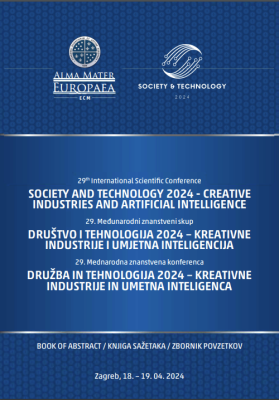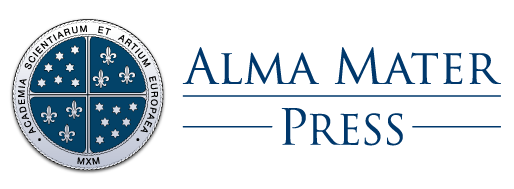29th lnternational Scientific Conference SOCIETY AND TECHNOLOGY 2024 - CREATIVE INDUSTRIES AND ARTIFICIAL INTELLIGENCE Book of Abstract
Synopsis
It is our pleasure to present the Book of Abstracts of the 29th International Conference “Society and Technology” at a time when the boundaries between technology, culture, and science are becoming increasingly interwoven and intertwined. This year’s conference is distinguished by its focus on “Creative Industries and Artificial Intelligence,” a topic of key importance for our future.
The Book of Abstracts is the fruit of months of hard work and dedication. It presents a wide range of works dealing with the impact of artificial intelligence on various aspects of our lives, from creativity and ethics to industrial and economic transformation. Each paper provides valuable insight into the complexity of the relationship between society and technology, opening the way for new research and solutions.
I want to thank all the authors for their valuable contributions and everyone else who contributed
in any way to the organization and work of the conference. May this Conference and Book of Abstracts be a source of inspiration and dialogue, encouraging us to further explore and collaborate to understand and shape the rapidly changing world around us.
Ivan Balabanić, Professor
Chairman of the Organizing Committee
From the opening speech of Rector of the Alma Mater Europaea University:
»… to this purpose, I would like to express my utmost gratitude to our deceased friends, the academician Professor Dr Jurij Plenković and academician Professor Dr Mario Plenković for several decades of work on bringing together scientists of different nations, countries, and cultures from all continents, especially from Central and South-Eastern Europe. During the most challenging times of the Balkan war, Jurij Plenković gathered scientists from Central and South-Eastern European countries and other world figures, including the USA and Japan. The Society and Technology conference, in partnership with the journal Informatologija, created a solid academic network that worked despite the war in the Balkans and consolidated peace, coexistence, and mutual respect of nations and cultures, especially in SE Europe.
We all know that the world is faced with new technological achievements, especially artificial intelligence, and at the same time, society is faced with new contradictions; some academics call this re-barbarization. The critical question before us is how to establish a balance in society that will ensure the continuity of the achievements of European civilization, including the protection of human rights, dignity, democracy, and the fair distribution of goods. Modern global regional and military contradictions specifically appeal to scientists to develop and use technologies and design social systems by European ethical norms to serve peace and well-being. An interdisciplinary approach and dialogue of natural, social, and spiritual dimensions is essential for solving contradictions between man and society. The century-long process of the differentiation of science led to a phase José Ortega called the totalitarianism of specializations. Partial knowledge and insights led to partial conclusions, especially the great ideologies and totalitarianism of the 20th century. Artificial intelligence represents a new tool that can creatively and effectively connect different scientific disciplines to solve modern challenges. In particular, Europe today is faced with demographic trends that, due to brain drain and unilateral migration, have created a sizeable intellectual deficit in the countries of Central Europe. This contradiction has European dimensions, so a solution is possible at the European level by making the necessary social, cultural, educational, financial, and institutional instruments. The European conference It's About People, organized by Alma Mater Europaea and the European Academy of Sciences and Arts in Salzburg, therefore supported the initiative of the Vice-President of the European Commission, Dubravka Šuica, to create a demography agency at the European level, which should be located in a country that is directly faced with these challenges.
All this requires an interdisciplinary approach that will enable comprehensive solutions, what we call a new renaissance for Europe's future.
Professor Dr Ludvik Toplak
Downloads


